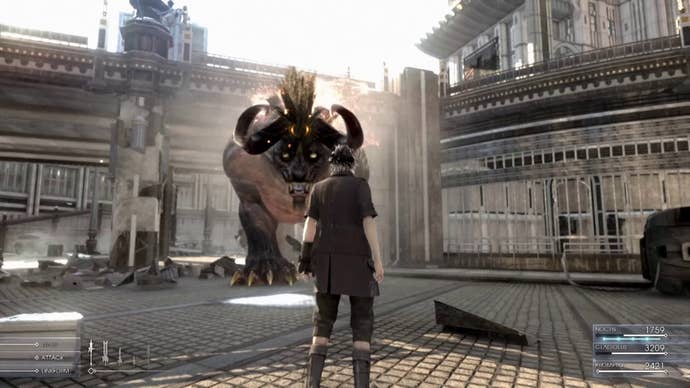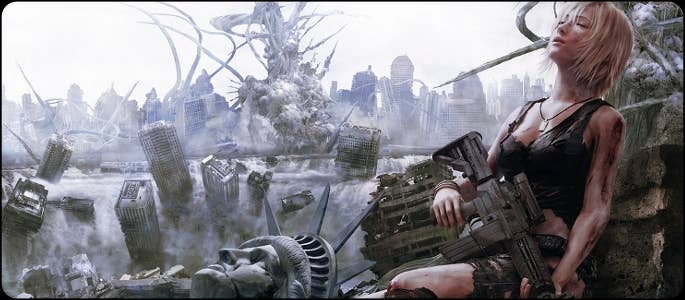One of Japan's Unsung Developers Makes a Move For Independence
The wizards at Hexadrive want to prove they can offer to gaming more than just tech savvy.
This article first appeared on USgamer, a partner publication of VG247. Some content, such as this article, has been migrated to VG247 for posterity after USgamer's closure - but it has not been edited or further vetted by the VG247 team.
You probably aren't familiar with the name Hexadrive, unless you're one of those rare people who doesn't zone out at the sight of a sequence of studio logos when you launch a game. But the little-known developer has had a hand in some major game releases, doing much of the heavy lifting needed to connect the dots between "big idea" and "actual release."
Hexadrive's technical wizardry has helped bring to life some of the most impressive-looking games on their respective platforms. They co-developed visually stunning PSP titles like Square Enix's The 3rd Birthday, salvaged the flaming wreck that was the original release of Konami's Zone of the Enders HD remaster for PlayStation 3, and lent a much-needed hand to Final Fantasy XV.

This year at BitSummit, however, Hexadrive took a major step to breaking beyond the world of digital ghostwriting. The company set up its own display booth to show off two of its own original creations: Mobile titles No Item, No Quest and Magical Password 1111. While a far cry from the high-end work they've performed in the service of others, such as with the HD conversion of Final Fantasy Type-0 a couple of years ago, these two humble handheld works represent a critical new venture for the company.
I met briefly with Hexadrive's Mizuki Terai and Jin-ichiro Okuda during the show to learn more about their future plans. The pair neatly embodies both the old guard and new for Hexadrive; Okuda, a buttoned-down career man, speaks to Hexadrive's 10-year history as a reliable partner. Meanwhile, the more youthful Terai with her bright, coral-colored hair, represents the company's new generation. Together, they seem determined to put Hexadrive on the map as something more than just an incidental logo you slip past on the way to the title screen.
Mizuki Terai: This is the game we're making — it's called Magical Password 1111. This is made by a group within the company called Ficustone. We're focused specifically on small projects, and this is only the second project we've put together.
USgamer: Is Ficustone a part of Hexadrive, or a partner?
MT: No, it's not the name of a company, it's actually a team of in-house people who are working on this project.
USG: Are these Hexadrive's first independent projects? I see your name a lot attached to other company's works, a lot of big games, but I don't think I've ever seen anything that's yours alone.
MT: This is only our second project, right. Our first project was a mobile game called "No Item, No Quest." Whenever we work on a really huge project, we always have a partner to collaborate with. Since we're a small to mid-sized company, we don't really have the resources for many in-house projects.
USG: Why have you chosen now to venture out into creating your own property?
Jin-ichiro Okuda: The massive, huge projects are really important to us as a corporation, but the more we work on those big projects, the more we feel that we'd like to have our own original projects — something that we can say, "This is our project." So now is the time for us to begin shifting to focus on something original.
Even though we work on large platforms with our major projects, it's a little hard for us to pull together the resources to create our own property for a platform like PlayStation 4. So these first games for mobile are the first steps toward that.

When it comes to making games, the most important thing is to have fans. By creating these small projects, we'd like to build up a fanbase gradually so that when it comes time to create a big game, we'll have the support we need.
Picastone is kind of like an educational program for our developers, especially the first game. These applications are made by really young designers who have just entered the company, to help them to learn to manage projects like this. Also, for console games, it takes a long time to launch and publish and everything. But the limitations of small projects like these make it easier for them to get a handle on the process — it's great training.
USG: When you work on a big project like Final Fantasy XV or The 3rd Birthday, how much creative input are you allowed? Or is your work on those games mostly technical?
JO: When we work with partners on big games or on conversions from one platform to another, we are brought in as technical support, because we really understand those logistics. But as a developer, we like to be creative — we're creative people.
USG: So this is an opportunity to get that creative impulse out.
JO: Exactly. And it helps motivate the staff, so they can be more passionate about their work.
USG: How many people work at Hexadrive, and how many people are working on this project?
JO: Magical Password 1111 is a team of seven people. Our previous game was made by five people. In total, the company is about 50 people in Tokyo and 50 in Osaka.
USG: Are you looking to localize these games?
JO: Our first game was made in Japan and translated to traditional Chinese for Taiwan and Hong Kong, to be followed by simplified Chinese. But the new game will be localized not only into Chinese but also English as well.
